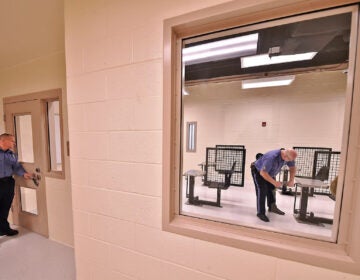Delaware juvenile justice reforms signed into law
Gov. John Carney signed three bills Thursday that aim to divert juveniles away from the criminal justice system —where about 3,000 juveniles are arrested every year.
Gov. John Carney, D-Delaware, signed three bills Thursday that aim to divert juveniles away from the criminal justice system in Delaware—where about 3,000 juveniles are arrested per year.
The pieces of legislation aim to ensure juveniles have access counsel, to increase social services for youth and to divert teenagers from Superior Court.
“We want all Delaware kids to become healthy and productive citizens of our state. That includes preventing kids from going down the wrong path and ensuring resources are available to help them learn and move beyond their mistakes,” Carney said.
One measure, sponsored by state Rep. David Bentz, D-Christiana, ensures juveniles understand their right to counsel and dictates a waiver of counsel cannot be approved until an attorney has explained the defendant’s rights.
A second bill, sponsored by state Rep. Debra Heffernan, D-Brandywine Hundred, expands access to the state’s civil citation program—a diversion program that provides opportunities for counseling and community service in return for a clean record.
First-time juvenile offenders of minor crimes can receive a citation from a police officer or school resource officer to enter the program as an alternative to going to court.
Since the program’s inception in 2015, 428 children have been referred to the program, which has an 89 percent success rate.
The bill adds possession of marijuana paraphernalia to the list of qualifying offenses, and youth will also be able to receive a second citation for a different offense if it has been more than 18 months since the last citation.
The third bill, sponsored by state Rep. J.J. Johnson, D-Wilmington, gives Superior Court judges the discretion to move a juvenile charged as an adult to the family court system.
Previously, if a child 16 or older was charged with riot, possession of an explosive device, possession of a deadly weapon during commission of a felony or wearing body armor during commission of a felony, the judge couldn’t transfer him or her to Family Court, even if they felt it was better suited for them.
“Every one of these boys and girls in the system is somebody’s son and somebody’s daughter—and we should be treating them the way we would want if it was our son or our daughter in there,” said Michael Arrington, chair of the Juvenile Justice Advisory Group.
“Sure, we have sanctions, sure, there’s accountability, but there’s also something the chief judges of the Family Court for the last five administrations have always held as true—it’s a court with a social conscience.”
Lisa Minutola, Chief of Legal Services for Delaware’s Office of Defense Services, has been part of the effort to improve the juvenile justice system in the state. She said she hopes the bills signed Wednesday will eventually be expanded.
She said she believes judges should also have discretion to move juveniles from Superior Court to Family Court if they’re charged with possession of a firearm during commission of a felony—a charge that’s still a mandatory prosecution in Superior Court as an adult.
There are also some offenses that come with a mandatory minimum sentence requiring children to enter a secured facility, Minutola said. She said she also believes judges should be able to have discretion when it comes to various sentences.
Minutola said Wednesday’s bill signing is a huge leap forward in the juvenile justice system, providing children a second chance at life.
“Medical science is telling us the same thing parents have always known—that kids are just different. Their brains work differently, the way they process risk, it all is just different than adults,” she said.
“We’re not trying to excuse bad behavior, but there is insight into why children act the way they do and why they make bad choices. With these bills, we’re going to give kids hope that even if they make bad choices they’re not hopeless, they are not the worst moment in their lives. They can rise above that, they can either stay out of the system, or even if they’re already in the system, there are ways to help them become successful members of society.”
WHYY is your source for fact-based, in-depth journalism and information. As a nonprofit organization, we rely on financial support from readers like you. Please give today.





